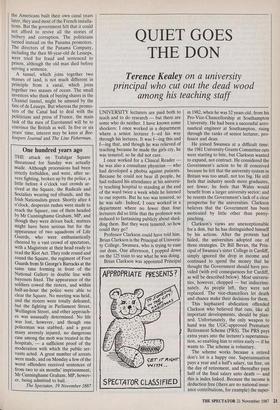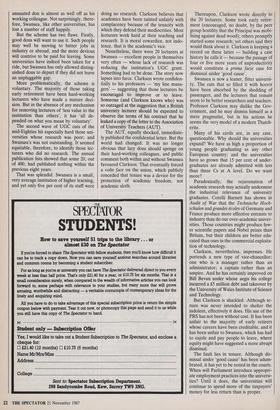QUIET GOES THE DON
Terence Kealey on a university
principal who cut out the dead wood among his teaching staff
UNIVERSITY lecturers are paid both to teach and to do research — but there are some who do neither. I have known some shockers: I once worked in a department where a senior lecturer f---ed his way through his lectures. It was f---ing this and f---ing that, and though he was relieved of teaching because he made the girls cry, he was tenured; so he did not care.
I once worked for a Clinical Reader — he was also a consultant physician — who had developed a phobia against patients. Because he could not bear ill people, he had reduced his attendance at his universi- ty teaching hospital to standing at the end of the ward twice a week while he listened to our reports. But he too was tenured, so he was safe. Indeed, I once worked in a department where no fewer than four lecturers did so little that the professor was reduced to fantasising publicly about shed- ding them. But they were tenured, so how could they go?
Professor Clarkson could have told him. Brian Clarkson is the Principal of Universi- ty College, Swansea, who is trying to ease out dons. One afternoon, I popped down on the 125 train to see what he was doing.
Brian Clarkson was appointed Principal in 1982, when he was 52 years old, from his Pro-Vice-Chancellorship at Southampton University. He had been a successful aero- nautical engineer at Southampton, rising through the ranks of senior lecturer, pro- fessor and dean.
He joined Swansea at a difficult time: the 1981 University Grants Committee cuts were starting to bite, but Clarkson wanted to expand, not contract. He considered the Government's action to be ill conceived because he felt that the university system in Britain was too small, not too big. He still feels that industry needs more graduates, not fewer; he feels that Wales would benefit from a larger university sector; and he resents the Government's lack of a clear prospectus for the universities. Clarkson believes that the Government has been motivated by little other than penny- pinching.
Clarkson's views are unexceptionable for a don, but he has distinguished himself by his actions. After the protests had failed, the universities adopted one of three -strategies. Dr Bill Bevan, the Prin- cipal of Swansea's sister College in Cardiff, simply ignored the drop in income and continued to spend the money that he thought the Government should have pro- vided (with evil consequences for Cardiff, as will be described below). Most universi- ties, however, chopped — but indiscrimi- nately. As people left, they were not replaced. The vice-chancellors let death and chance make their decisions for them.
This haphazard abdication offended Clarkson who believed that cuts, like all important developments, should be plan- ned. Unfortunately, the only weapon to hand was the UGC-approved Premature Retirement Scheme (PRS). The PRS pays extra years into the lecturer's superannua- tion, so enabling him to retire early — if he wants to. The scheme is voluntary.
The scheme works because a retired don's lot is a happy one. Superannuation pays a year and a half's salary, tax free, on the day of retirement, and thereafter pays half of the final salary unto death — and this is index linked. Because the income is deduction free (there are no national insur- ance contributions, for example) the super- annuated don is almost as well off as his working colleague. Not surprisingly, there- fore, Swansea, like other universities, has lost a number of staff happily.
But the scheme has two flaws. Firstly, good dons will want to use it. Such people may well be moving to better jobs in industry or abroad, and the more devious will contrive to be paid for leaving. Some universities have indeed been taken for a ride, but Swansea has only allowed disting- uished dons to depart if they did not leave an unpluggable gap.
More problematically, the scheme is voluntary. The majority of those taking early retirement have been hard-working lecturers who have made a mature deci- sion. But in the absence of any mechanism for removing lecturers of 'less value to the institution than others', it has 'all de- pended on what you mean by voluntary'.
The second wave of UGC cuts of the mid-Eighties hit especially hard those uni- versities whose research was poor; and Swansea's was not outstanding. It seemed equitable, therefore, to identify those lec- turers who did no research. The annual publication lists showed that some 20, out of 400, had published nothing within the previous eight years.
That was splendid. Swansea is a small, very average institution of higher learning, and yet only five per cent of its staff were doing no research. Clarkson believes that academics have been tainted unfairly with complacency because of the tenacity with which they defend their mediocrities. Most lecturers work hard at their teaching and research. It is moral cowardice, not indo- lence, that is the academic's vice.
Nonetheless, there were 20 lecturers at Swansea — excellent people in themselves very often — whose lack of research was reducing the institution's UGC grant. Something had to be done. The story now lapses into farce. Clarkson wrote confiden- tially to his professors — 'my line mana- gers' — suggesting that those lecturers be encouraged to improve or to leave. Someone (and Clarkson knows who) was so outraged at the suggestion that a British university lecturer should be expected to observe the terms of his contract that he leaked a copy of the letter to the Association of University Teachers (AUT).
The AUT, equally shocked, immediate- ly published the confidential letter. But the world had changed. It was no longer obvious that lazy dons should sponge on their hard-working colleagues, and public comment both within and without Swansea favoured Clarkson. That eventually forced a volte face on the union, which publicly conceded that tenure was a device for the protection of academic freedom, not academic sloth. Thereupon, Clarkson wrote directly to the 20 lecturers. Some took early retire- ment (encouraged, no doubt, by the peer group hostility that the Principal was mobi- lising against dead wood); others promptly started some research; yet others said they would think about it. Clarkson is keeping a record on these latter — building a case history he calls it — because the passage of four or five more years of unproductivity would constitute a prima facie case for dismissal under 'good cause'.
Swansea is now a leaner, fitter universi- ty. The cuts that so filled it with horror have been absorbed by the shedding of passengers, and the lecturers that remain seem to be better researchers and teachers. Professor Clarkson may dislike the Gov- ernment, and he may dismiss himself as a mere pragmatist, but in his actions he seems the very model of a modern Thatch- erite.
Many of his cavils are, in any case, questionable. Why should the universities expand? We have as high a proportion of young people graduating as any other European country; and the universities have so grown that 15 per cent of under- graduates are already admitted with less than three Cs at A level. Do we want more?
Paradoxically, the rejuvenation of academic research may actually undermine the industrial relevance of university graduates. Corelli Barnett has shown in Audit of War that the Technische Hoch- schulen and grandes ecoles of Germany and France produce more effective entrants to industry than do our over-academic univer- sities. Those countries might produce few- er scientific papers and Nobel prizes than Britain, but their children are better edu- cated than ours in the commercial exploita- tion of technology.
Clarkson, nevertheless, impresses. He portends a new type of vice-chancellor; one who is a manager rather than an administrator; a captain rather than an umpire. And he has certainly improved on Bill Bevan under whose aegis his college incurred a £5 million debt and takeover by the University of Wales Institute of Science and Technology.
But Clarkson is shackled. Although te- nure was never intended to shelter the indolent, effectively it does. His use of the PRS has not been without cost. It has been unfair to the majority of early retirers whose careers have been creditable, and it has been unfair to Swansea, which has had to cajole and pay people to leave, where equity might have suggested a more abrupt dismissal.
The fault lies in tenure. Although dis- missal under 'good cause' has been adum- brated, it has yet to be tested in the courts. When will Parliament introduce appropri- ate employment practices into the universi- ties? Until it does, the universities will continue to spend more of the taxpayers' money for less return than is proper.



































































 Previous page
Previous page